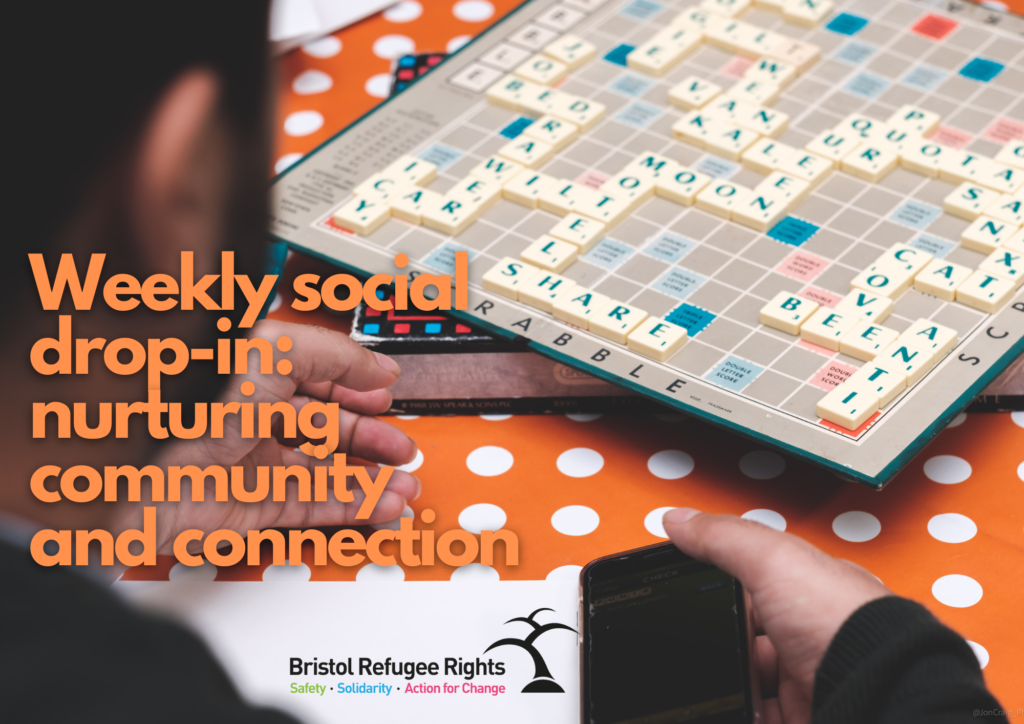“In our language there are no words for depression”: building resilience and wellbeing under the Hostile Environment

By Alice Cutler
Wellbeing; is defined as the state of being comfortable, healthy, or happy.
People seeking asylum and refugees are more likely to experience poor mental health than the UK population, including high rates of depression, PTSD and other anxiety disorders (Refugee Council 2022; Morgan et. al., 2017). While mental health problems that refugees and asylum seekers face are linked to pre-migration experiences (such as war trauma), they are also linked to post-migration conditions (such as separation from family, difficulties with asylum procedures and poor housing). Distress among displaced people is very common, and is not in itself a mental illness though can persist without timely and appropriate support networks. Common mental illnesses in displaced adults include PTSD (31%), depression (31%), anxiety disorders (11%), and psychosis (1.5%). There are also high rates of distress, grief and PTSD in displaced people under the age of 18, especially in the context of war and trauma (Academy of Medical Royal Colleges 2020).
Yet, people seeking asylum and refugees experience a number of unique barriers to accessing treatment – both systemic and individual. In 2014 BRR launched a project to be able to focus on wellbeing. We explored tools that would help us to evaluate the impact that we were having and wrestled with how different cultures and languages talk about mental health and wellbeing. We began to use the 5 ways to wellbeing to describe our services;
Connect, Take Notice, Be active, Keep Learning, Give
Over the past two years there has been an increase in people talking about wellbeing. We have all been through a global pandemic, there is increasing understanding of the need for preventative work and self care to prevent mental illness. As an organisation we have strong roots in psychologically informed ways of working, we were set up by retired professionals including social workers and mental health practitioners. However, in 2022, with stress levels in the general population higher than ever and high staff turnover it has felt like time to focus more concretely on becoming more trauma informed in everything that we do.
Walking into the BRR office there is a large sign with an arrow pointing past a vibrant flower bed filled with lavender, vegetables and trees. A small group of volunteers are having a coffee together before their shift and admiring the pergola that stretches across the beds.
A member arrives who has not been here before and rings the bell, our receptionist greets them with the warmest of smiles. As someone with lived experience of the system and a long standing volunteer she knows the importance of a good welcome.
She escorts them up to the main hall. He is met by a multilingual staff member, a highly skilled interpreter who was a volunteer and now has finally got their status. He explains what will happen next. It is the last week of the Afghan group, a service delivered by Trauma Foundation South West, their first group therapy, set up in response to long waiting lists and the desperate situation for many people from Afghanistan. BRR provided the room and paid for an interpreter. “We didn’t know if it would work, at first people could only talk about their own struggles but a real sense of group support has developed.” our staff member tells me.

After being offered tea and a seat to wait to do an assessment, our staff member shows them around: “There is a barber, an important contribution to feeling OK can be a haircut!
Or you could join in the scrabble!” After the new member interview the first priority is to fill in a Haven referral form which asks for any immediate health needs. The new member reports sleep problems, nightmares and pain in his leg from an injury.
Our volunteer yoga teacher, drops off the mats from the stretch and relax group. Another has arrived to help with distribution of smartphones, whatever else we can do to support wellbeing it is often access to Whatsapp and connections with loved ones that makes the biggest difference.
Back at the office, recently covered in plants due to a donation; someone is photocopying for her basic literacy class. It’s only a few people and lasts just 40 minutes but it’s about as long as some can manage. “We aim to build confidence for people to feel OK in a classroom, this is like phonics for adults.”
The advice workers are preparing for a monthly, mental health pathways meeting to help understand where people are at and if consent has been given to coordinate work.
“He has said that he will try to take his own life if he goes back there but there is literally no other choice for him”.
It is so hard to distinguish between the high level of distress many of our members experience and an active safeguarding risk.
We have to be careful about setting expectations and to protect our staff from being overwhelmed. At the end of the day we aim to treat each person as a human with needs that although we can not always meet, we acknowledge them and work within our capacity to do what we can.
